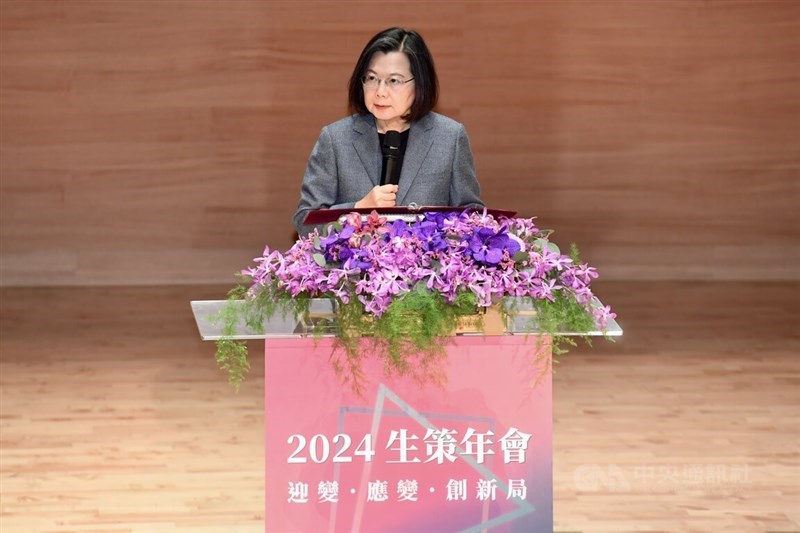AI highlighted at biomedical forum as Tsai lauds industry chain
President Tsai Ing-wen and tech leaders appearing at a conference on the biomedical industry Monday praised the industry chain that has taken shape in Taiwan and artificial intelligence's potential in health care in the future.

President Tsai Ing-wen (蔡英文) and tech leaders appearing at a conference on the biomedical industry Monday praised the industry chain that has taken shape in Taiwan and artificial intelligence’s potential in health care in the future.
In a speech at the 2024 “Institute for Biotechnology and Medicine Industry (IBMI) Annual General Meeting,” Tsai said that during her eight years in office, the IBMI connected Taiwan’s medical, biotech, and technology sectors, resulting in a biomedical industry chain.
“Building on the foundation of the national health insurance (NHI) system and Biobank, we have developed a big data health care system,” Tsai said.
Taiwan’s biomedical sector has harnessed these and other domestic technological advantages, leading to the expansion of international commercial opportunities, she said.
Tsai, who will be leaving office in May, said Taiwan has become a crucial hub for international biomedical innovation and research, and she hoped for more cross-sector collaboration in Taiwan to further advance the biomedical industry.
Quanta Computer Chairman Barry Lam (林百里), who serves as the vice president of the IBMI, argued that such collaboration would be helpful in bringing artificial intelligence into Taiwan’s health care and medical systems.
Through cooperation between academia, the health care system, and the information technology sector, the power of new AI technology can be harnessed and used to collectively address health and medical challenges.
“Generative AI not only represents the latest technological revolution but also holds immense potential to transform medicine, making it likely to be a major driver of the health care sector,” Lam said.
Asustek Chairman and IBMI Director Jonney Shih (施崇棠) agreed with Lam and presented his company’s approach to smart health care in a separate session at the conference on building a digital foundation for future health care services.
Shih said the COVID-19 pandemic had reshaped the medical and health care sectors, and accelerated their digital transformation in a way that could yield precision health and virtual care.
After playing a pre-recorded conversation of a patient seeking information on how to handle an ailment (such as finding an appropriate doctor) from the company’s AI robot “Zenbo,” Shih emphasized that the future of medical services will depend on innovative digital technologies centered around AI.
“Let’s seize the trend of smart health care and join with domestic and international partners to collectively build a smart health care industry that provides more comprehensive, personalized, precise, attentive, and efficient next-generation health care experience,” Shih said.
Date: 2024-3-4
Source: Focus Taiwan